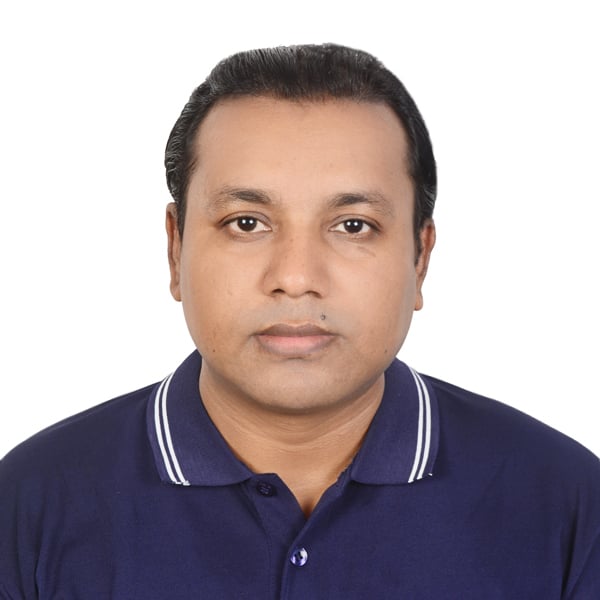
The Department of Computer Science is pleased to welcome new assistant teaching professor Sujan Kumar Roy. Roy says that Michigan Tech’s reputation for excellence in engineering, science, and technology, along with its strong emphasis on research and innovation, drew him to the university.
“The collaborative environment at MTU, where interdisciplinary research is encouraged and supported, aligns perfectly with my own research interests,” he says. “I saw Michigan Tech as an ideal place to contribute to cutting-edge research, inspire the next generation of tech leaders, and collaborate on projects that have real-world impact.”
Roy’s research interests range from applications of AI, machine learning, and deep learning, to cybersecurity, medical image analysis, healthcare systems, and speech enhancement.
“These technologies offer groundbreaking solutions for detecting cyber threats, analyzing medical images, personalizing healthcare, and improving speech clarity” Roy says. “The intersection of these technologies with real-world challenges motivates me to explore their practical applications and their impact on critical societal issues.”
In a recent research project, Roy used deep learning for histological image analysis in cancer detection, applying models like Vision Transformer Networks and U-Net to enhance diagnostic accuracy. He says this work aims to improve on existing methods for analyzing MRI and X-ray images, boosting precision in early cancer detection.
He is also working on advancing Explainable AI (XAI) for healthcare, aiming to enhance the transparency and trustworthiness of AI models. “These projects are compelling due to their potential to tackle significant challenges in medical diagnostics and healthcare transparency,” he says.
Roy’s teaching philosophy focuses on fostering independent problem-solving and engaging students through a dynamic approach. To encourage student interest and engagement, he uses practical examples and case studies and encourages a dynamic feedback loop where students can ask questions and provide input, keeping them actively involved in the learning process.
“I use real-life cases to keep course content relevant and captivating, ensuring students stay motivated,” he says, adding that he tailors his teaching to accommodate diverse backgrounds and learning styles.
“Teaching computer science and data science allows me to transform complex concepts into practical skills that empower students to innovate,” Roy says. “It’s rewarding to witness students applying their skills to real-world challenges as they become creators and researchers who can push the boundaries of technology.”
This academic year, Roy is teaching Foundations of Data Science (DATA 2201) and Computational Intelligence (EE/CS5821).
Roy’s career as an educator and researcher, spanning 13 years, has been marked by a commitment to fostering innovation and academic excellence. “My work has been instrumental in advancing speech enhancement techniques and has opened new avenues for interdisciplinary research, and I’ve had the privilege of mentoring students through complex projects and guiding them to make significant contributions in these fields,” he says.
“Throughout my academic and professional journey, I’ve consistently sought to push the boundaries of what’s possible in computer science and data science,” Roy says. “Earning my Ph.D. from Griffith University, Australia, was a pivotal milestone where my research on integrating machine learning with signal processing garnered notable recognition, including that university’s Award of Excellence in Research Thesis.”
Before joining Michigan Tech, Roy was an associate professor in the Department of Computer Science and Engineering at the University of Rajshahi, Bangladesh, where he instructed undergraduate and graduate courses and supervised numerous research projects, theses, and dissertations. His role also included significant involvement in curriculum development and academic committee leadership, helping to shape the direction of the department’s educational offerings.
Roy says that the collaborative academic atmosphere at Michigan Tech, along with the beautiful natural setting, make Houghton an ideal place to both live and work.
“The Houghton area has been a delightful discovery, offering a unique blend of natural beauty and academic vibrancy,” Roy says. “I particularly appreciate the scenic landscapes and outdoor recreational opportunities, which provide a refreshing contrast to the bustling environments of larger cities. The tranquil surroundings and picturesque waterfronts and forests create a peaceful atmosphere conducive to both work and relaxation.”
Outside of academia, Roy enjoys traveling, exploring new cultures, watching movies, spending time with friends and family, and reading.
Learn More about Sujan Kumar Roy on his faculty profile.
The Michigan Tech College of Computing, established in 2019, is the first academic unit in Michigan dedicated solely to computing, and one of only a handful such academic units in the United States. The college is composed of two academic departments. Department of Computer Science bachelor of science degree programs are in computer science, cybersecurity, data science, and software engineering; master of science programs are in applied computer science, cybersecurity, and data science; and a doctoral program is in computer science. Department of Applied Computing bachelor of science degree programs are in cybersecurity, electrical engineering technology, information technology, and mechatronics; master of science degree programs are in health informatics and mechatronics; and a doctoral program is in computational science and engineering.
Follow the College of Computing on Facebook, Instagram, LinkedIn and Twitter.